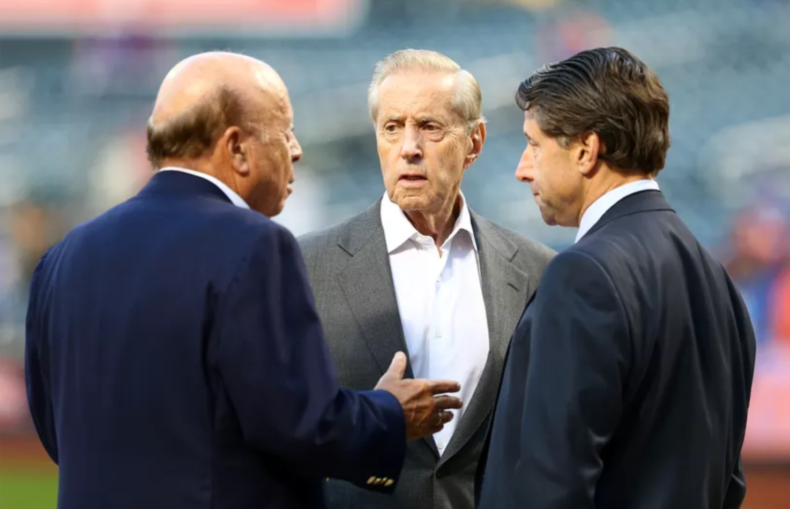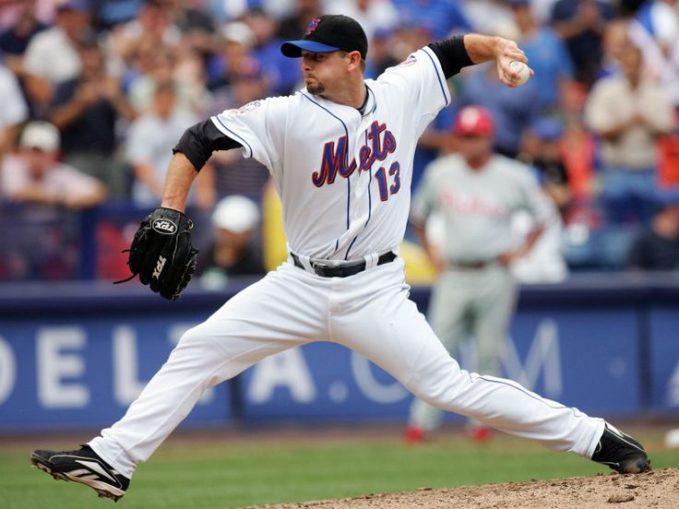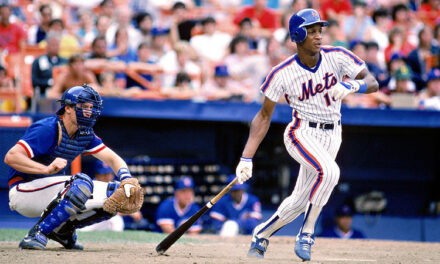
Mike Puma, the longtime New York Mets beat reporter for the New York Post, has seen and heard quite a bit during his time covering the team in some capacity over the last two-plus decades.
During his time with the team, Puma has witnessed a myriad amount of events both on and off the field. From the 2000 Subway World Series; the 2006 season in which the Mets looked to be the best team in the National League; the Wilpon/Bernie Madoff fiasco; making it to the World Series in 2015; to all the personalities and oddities that happened along the way, Puma was along for the ride to detail all of it for his readers.
Taking the reporting he conducted, Puma decided to write a book about his tenure with the Mets titled If These Walls Could Talk: New York Mets: Stories from the New York Mets Dugout, Locker Room, and Press Box, released on April 27 of this year.

Triumph Books
The book, published by Triumph Books, peels back the curtain and reveals details from the Met clubhouses over the years. Puma chronicles the highs and lows of the team over the last two decades and intersperses anecdotes he was told from dozens of interviews he conducted with players, coaches and executives while doing research for his book.
From Bobby Valentine feeling he was fired over a comment he made to Fred Wilpon after a coaches’ meeting to Billy Wagner confirming he was the one who stuck the “Know your place, rook” note on Lastings Milledge’s locker to Zack Wheeler being told he couldn’t sit in the dugout with his team during the 2015 National League Divison Series, Puma’s book is chock-full of accounts that will make readers laugh, cringe and raise an eyebrow.
Puma does a great job transitioning from the various Mets eras and takes readers along for the ride in reliving some of the best – and worst – moments in team history.
I had the pleasure of speaking with Puma in early May about his just-released book.
MMO: What prompted you to write this book?
Puma: I had never really given serious consideration to writing a book before; it’s very time-consuming and covering the beat seems like a job and a half sometimes. But two years ago, Triumph Books reached out to me and gauged my interest and I said, ‘I don’t know if I want to.’ I was kind of lukewarm.
We went back and forth a little bit. Finally, I got to the point where I started thinking about it a little bit more. I was like Well, I have been around the team since the late nineties, and I don’t know if I’ll ever get another opportunity to write a book. Maybe this is the only chance to do it. They were willing to give me a lot of freedom as far as what direction I wanted to take and how I wanted to do it.
I decided to do it and that was April 2019, so that’s kind of what prompted it.
MMO: What was the writing process like for you while still covering your beat for the New York Post?
Puma: The first thing was just lining up interviews and people I wanted to talk to from the last two decades. That just took time; that was time-consuming just getting on the same schedule with people and trying to figure out when I could talk to them. I’d say the first six months or so I didn’t do much writing at all, it was just trying to line up the interviews and do the reporting for the book.
I did most of the writing on the project after the 2019 season ended. And then in Spring Training 2020, I got a lot of work done on it too, being down in Florida. It was tough sometimes to try and balance everything, but somehow, I pulled it off.
MMO: You peel back the curtain and reveal some great stories from the last two-plus decades. Do you have a favorite anecdote from the book?
Puma: I kind of like the Bobby Valentine story about him thinking he was going to come back as manager after the 2002 season, and agreeing to let Jeff Wilpon sit in on the coaches’ meeting. And then [what happened] at the end of the meeting, where Jeff rubbed Valentine the wrong way. Valentine is convinced that that’s what got him fired and I had never heard that before. I think that one probably stands out.

MMO: The Wilpons are featured prominently in much of the book. With so much fan disdain for the previous ownership, what was your takeaway from some of the stories you shared?
Puma: The Wilpons certainly rubbed some people the wrong way. We know they rubbed the fans the wrong way and they rubbed some of the players the wrong way, the people with the club.
I think one misconception that I’d like to clear up is – and I see this on Twitter – where people come to me and say that I waited until the Wilpons were gone to write this book. That’s not the case. This book was coming out whether they owned the team or not. When I signed the deal to do the book two years ago, these stories were going to be in the book one way or the other. I didn’t know when I agreed to do the book that they were on the verge of selling the team.
It’s easy for people to look at it like you’re telling these stories when they’re gone. Well, no, these stories were coming out regardless, one way or the other. It just worked out that they’re gone now.
MMO: One of the anecdotes that caught my attention, and I tweeted about, was the Zack Wheeler story. The crux of it was that the Mets would not let Wheeler come and sit in the dugout during the 2015 National League Division Series. Can you expand a bit on that?
Puma: It definitely rubbed him the wrong way at the time. He wanted to come up from Florida during his rehab at the end of 2015 to be with the team in the postseason. He was told no he couldn’t, and they didn’t want him up there. I think Wheeler half understood that.
The thing that kind of jarred him was he asked if he could have some tickets to sit in the stands and watch in the stands. The Mets came back to him and said no. They told him that if he wanted tickets he had to buy his own.
I didn’t mention this in the book, but I asked Sandy Alderson about it after the fact, and he claimed that he didn’t know anything about that. I have a suspicion that it was Jeff Wilpon’s call. I asked Wheeler and he doesn’t know where it came from. I was never able to find out who kind of gave that edict that he had to buy his own tickets. But it probably came from the top.
He said it sat with him for a while and he eventually got over it. It motivated him to want to get back to the postseason as an active player. I’m sure it’s not the reason he left to go to the Phillies. If the Mets had offered him $120 million as the Phillies did, he’d probably be pitching for the Mets right now. But it’s something that irked him a little bit at the time.
MMO: And you heard about that story after the fact?
Puma: Yeah, this was the summer of 2019 that I talked to Wheeler about it. I told him I was writing the book and we talked about a few different things. It’s just something that popped up in the course of talking with him when I asked him what he remembered about 2015 and about being sidelined at the time. He brought this story to my attention.
MMO: Were there any stories that didn’t make the book for one reason or another?
Puma: No, I think everything I deemed fresh material I put in the book. I don’t think there’s anything in there that I really held back for one reason or another. I wanted the best stuff possible in there.
MMO: You detail your career in the book, and how you eventually got to cover the Mets for the New York Post. For those who haven’t read the book yet, can you talk a bit about your career in journalism?
Puma: I graduated from Fordham in the early nineties. I wanted to do radio and worked at WFUV, the radio station of Fordham, doing basketball games, play-by-play and hosting the one-on-one shows. I wanted to do play-by-play and I went back home to Waterbury, Connecticut, and started doing some high school football play-by-play, and started doing some production work for ESPN Radio which had launched at the time.
I got my start in print at the local newspaper in Waterbury, Connecticut, at the Waterbury Republican-American. They were looking for part-time sports clerks, and I didn’t have any writing experience at the time. The sports editor had heard me doing the high school broadcasts and thought I might be good on the staff as somebody that could bring some high school sports perspective to the department. So that’s kind of how I got started, working part-time covering high school sports up in Waterbury, Connecticut.
I moved up to the Connecticut Post in Bridgeport, and that’s where I started covering baseball and that’s kind of where I pick it up [in the book] in that ’98 season. And then I was told the Mets were going to be part of my responsibilities. Then I started covering the Mets and Yankees, not really as a beat, just bouncing back and forth between the two teams when they were home. I went to the New York Post in 2007, kind of backing up on the Mets and Yankees and I’ve been on the Mets beat since 2010 now.
MMO: Covering both the Yankees and Mets early on, what differences did you encounter as a member of the media between the two clubs?
Puma: The Yankees were more buttoned-down I would say. They were more of a corporate culture. I thought the Mets were always more fun to be around as far as some of the characters they had back then on those late nineties teams, whether it was Johnny Franco, Al Leiter, Mike Piazza. I guess the best way to describe the Yankees is they were more of a corporate atmosphere where the Mets, I thought, were more fun.

MMO: Are there one or two players that stand out to you from your time covering the Mets that had the best personalities and/or were good to the media?
Puma: I always loved covering Billy Wagner. He was so honest. There’s a quote from Rick Peterson when he said, “If it came into Billy’s mind, it came out of his mouth.” Which is true. He was always great with the media.
The year and a half Jeff Francoeur was on the team, he was a fun guy. He was another guy that was unfiltered and very helpful to the media. Those two pop into my head immediately, and I think both of them won the Good Guy Award that the New York staff of the BBWAA (Baseball Writers Association of America) gives out every year to the player that’s most helpful to the media.
MMO: Speaking of Wagner, your book confirms that he was the one that stuck the note on Lastings Milledges’ locker in 2006 that read, “Know your place, rook!”
Puma: [Laughs.] I think people, if they didn’t know it, strongly suspected it all these years. But it was the first time Wagner really opened up about the subject. I don’t think he had spoken extensively on the record about it before. I thought it was good in giving his perspective. And then Cliff Floyd jumped in talking about an incident in Philadelphia where he and Milledge were going to get to the ballpark early to work out and show that Milledge was committed. And then Milledge showed up at noon for a one o’clock game, well beyond the reporting time, and looking for his name on the lineup card.
I thought those anecdotes were very good, and Wagner coming forward and talking about it really for the first time added to the book.
MMO: What do you hope readers take away from the book?
Puma: Maybe a little bit of the dysfunction of the Mets in the last two-plus decades. There have been ups and downs, obviously, but I mostly hope they have fun with the book and get to see a little behind the curtain of what players, managers and executives were thinking at the time.
Often, what comes out in real-time is you get a lot of the varnished truth, and as years go by players are more likely to drop their guard a little bit and give you the unvarnished truth of what happened in certain situations. I kind of hope that this book gives you a look at that.
Follow Mike Puma on Twitter, @NYPost_Mets















